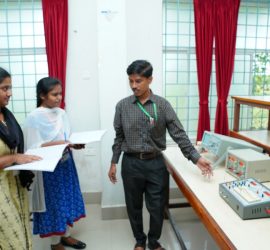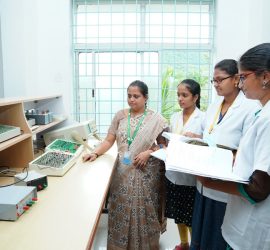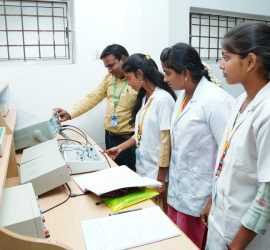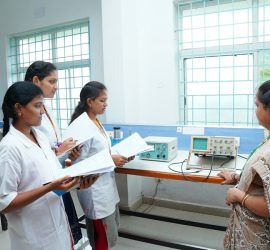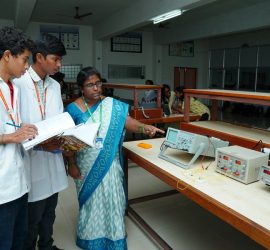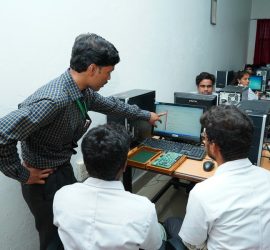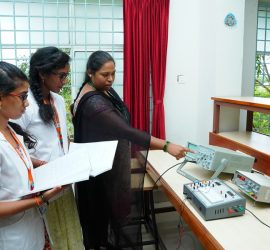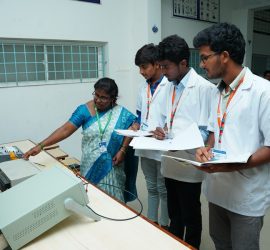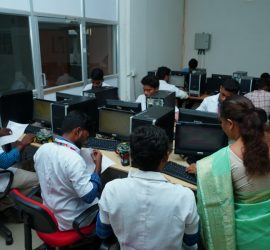The Department of ECEwas established in 2008 with an initial intake of 60 students in UG program and the intake was enhanced to 120& 180 in the years 2009& 2013 respectively. The intake is further enhanced with 240 in 2023. The department introduced a PG Program namely VLSI Design with intake of 18 students in the year 2012 and Embedded Systems with intake of 24 students started in the year 2014.
The primary objective of this department is to provide Quality education to the students, to mould them into good citizens of the country and make them rise ahead with knowledge and confidence to face the competitive world.
The undergraduate and post graduate programmes of the department of Electronics and Communication impart solid technical background among the students which help them to shine in their respective fields. The department put all its efforts to make the students to compete internationally and to produce creative solutions to society’s needs, universal moral values, suite to professional ethical code, and to generate any knowledge and technologies essential to the local and global needs in the field of Electronics & Communication.
The quality teaching and guidance by highly qualified and experienced faculty members. The regular interaction between students and faculty helps student to apply the theoretical knowledge to real life situations. The ECE Department is one of the strongest departments in the campus and stands high in its objectives and outcomes. The Department is technically depot with well experiencedlabs and qualified staff members.
Seminars, Workshops and Technical Symposia are conducted in the department to keep faculty and students updated with latest developments in various technologies. In all courses the Department has built an excellent reputation for its graduates in terms of placements.
Department Vision
To render effective technical education with innovation and invoke enthusiasm among the students to pursue higher education, prepare them to compete globally and make a significant contribution to the society in the field of Electronics and Communication Engineering.
Department Mission
B.Tech. in ECE
M.Tech. in VLSI
M.Tech. in Embedded Systems
Program Educational Objectives (PEOs):
After the completion of the Program, the graduates of B. Tech. (ECE) will
PROGRAM OUTCOMES (PO)
On successful completion of the Program, the graduates of B. Tech. (ECE) Program will be able to:
Program Specific Outcomes (PSOs):
On successful completion of the B. Tech. (ECE) Program, the graduates will be able to
Programme Educational Objectives (M.Tech (VLSI))
This programme prepares graduates to
Programme Outcomes (M.Tech(VLSI))
Programme Outcomes (M.Tech(VLSI))
Programme Educational Objectives (M.Tech (ES))
This programme prepares graduates to
Programme Outcome (M.Tech(ES))
Programme Specific Outcomes (M.Tech(ES))
Labs
Academic Regulations and Syllabus
Academic Regulations and Syllabus
| ECE M.Tech VLSI Design – SRET25 Syllabus | Download |
| ECE M.Tech VLSI Design – SRET24 Syllabus | Download |
| Academic Regulatios M.Tech R21 Syllabus | Download |
| Academic Regulatios M.Tech R17 Syllabus | Download |
| ECE M.Tech VLSI SD – R21 Syllabus | Download |
| ECE M.Tech VLSI SD – R17 Syllabus | Download |
| ECE M.Tech DSCE – R21 Syllabus | Download |
| ECE M.Tech DSCE – R17 Syllabus | Download |




